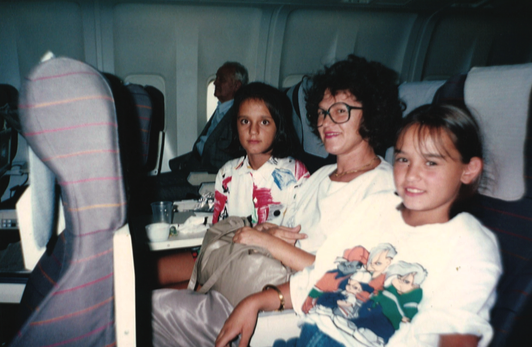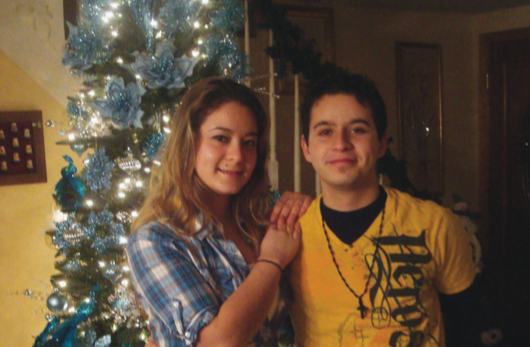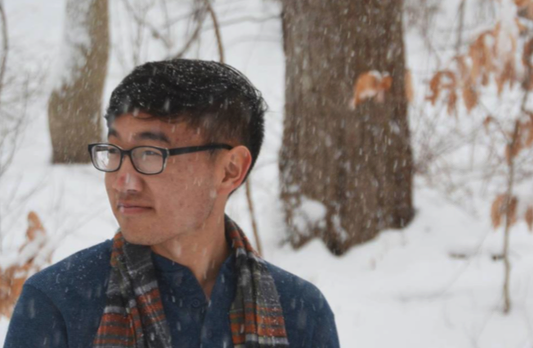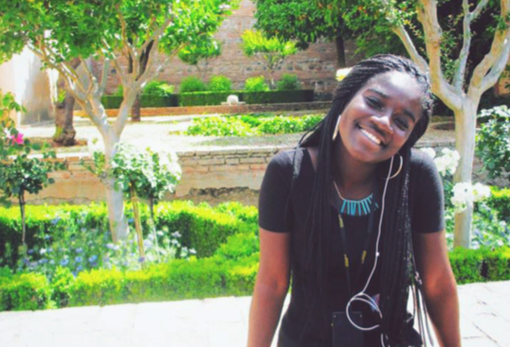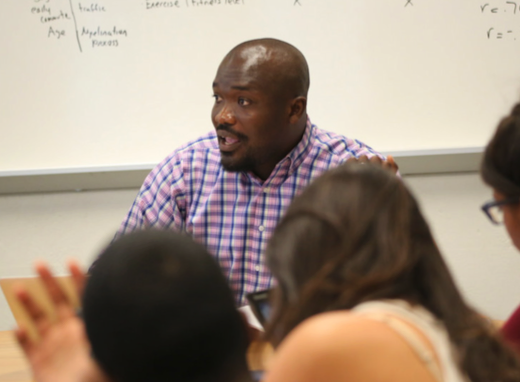Ms. Kolina Koleva has been a math teacher at Choate for three years. She is an immigrant from Bulgaria.
In 1989, when I was six, the Berlin Wall fell. We were a socialist country in the 80s, and people mostly complained about things like waiting in line in the cold to get bread. We had one bread — whatever was made in the factory in the city. We bought two loaves, and we went home, and we ate that. There was only one type of anything.
After the wall fell, more private companies were started, and people began making more money — increasing the gap between the rich and the poor. It went from, “Oh, I have to wait in line for bread again,” to, “Oh, I don’t have money, and I don’t know how I’m going to survive this month.” I always wondered, “Well, why don’t we go back?” To me, it seemed like an easy choice.
My dad applied for a visa pretty much as soon as the wall fell, when he saw that things were going to be changing a lot. He came to the U.S. two years later. He worked for a few years until he got more settled in and then brought us over. My mom, my sister, and I came in 1993, when I was ten.
We got to Los Angeles, where my dad lived, super late at night, and I remember thinking how many cars there were, how wide the freeways were — everything was just big and bright and shiny, and I just thought, “Where am I?”
My mom cleaned offices and houses, and she would go to night school to learn English, but after a year, she just couldn’t handle the culture change. So we went back to Bulgaria for two years, where she continued to take classes and study English. That was the toughest time for me, because school had just advanced so much that I felt behind. But that’s life.
We came back in eighth grade, to San Diego. I finished that year, and then high school, and I went to college there, too. My dad, who is very conservative and practical about money, saved up to send us back to Bulgaria every summer so we wouldn’t forget the language.
In the years since, I’ve always held on to the Bulgarian side of me. I really miss Bulgaria. I miss the food — the tomatoes, especially. When I’m there in the summer, half of my meals are just tomatoes. I miss the people. I miss the views — I grew up in the mountains. I miss the quirkiness. In the springtime here, I look over the grass fields, and it’s perfectly cut. I just want one little grass area to stick out, to be different, to be off place. In Bulgaria, almost everything is torn down, and it just gives it this feel of, “I’m not perfect, but I’m here.”
Ms. Karina Alvarez Acosta has been at Choate for eight years. Currently, she works with the Student Activities Center as a shuttle driver. She is an immigrant from Mexico.
I was in ninth grade when I moved. My father had already lived here for ten years; he came when I was about three months old. He decided to bring us to give us a better future, a better life, and he was the one that applied so that we could come.
The most difficult thing when we had just moved was that we could not communicate. We learned little by little, but it was difficult. I did not want to go to school because of that. I thought, “What am I going to do? I do not understand anything.”
About a month after arriving, we went to the Spanish Community of Wallingford (SCOW) organization, and Julie Oxborough tutored us. She taught us how to say numbers, and she taught us many words. She brought us books to read, and she brought us her daughters to talk to them.
We did not understand much, but she helped us a lot. We worked with her for about a year.
When I went to school, I really tried hard. I looked for options; I looked for people to guide me. But I didn’t even know how to start. When I was signing up for school, people just told me, “Go online and go to FAFSA,” but at that time I did not know what that was. I didn’t know what to do. I didn’t know how to use a computer.
I stopped school after twelfth grade because I had to work and help my parents. My mom lost her job around that time, and we all had to help, so I did not focus on my studies.
But eventually, I realized how important it is to go to school. It’s very hard because employers always ask for a degree. If you don’t have a degree, they ask for experience. If you don’t have experience, what are you going to do? And I’d also like to start a family, but what am I going to provide them without education? Everything would stay the same. Without education you can’t go anywhere.
That’s why I decided to go back to school, and I’m still at school. It’s hard, because I obviously work part-time. (I’m working with Edible Arrangements, and I’m also a shuttle driver for Choate.) But I have improved my typing and writing skills. I took a keyboarding class, and now I can type a lot faster. I’ve learned many new words, too. My plans now are to finish the Billing and Coding Associate’s Degree at Gateway in New Haven.
Victor, my younger brother of four years, has a baby so he has to work. But I’m advising him to go back to school too, because it’s hard otherwise.
You can judge others by just looking at them, but you will not realize everything that is going on — how they arrived to a country where they did not know the language. If you do not know how to communicate, you feel rejected by people. Doors are slammed in front of you a thousand times. But I keep knocking and knocking. I keep applying until someone gives me an opportunity.
It’s frustrating when you don’t get a chance, but everything that has happened to me has made me stronger, and I will fight for what I want. I have to find a good job. It takes time, but I think it’s never too late to achieve what you want.
Baji tumendemberel ’18 is a two-year junior from Milford, Conn. He is an immigrant from Mongolia.
When I was five years old, we moved to Connecticut because my mother got a special academic visa to study at the University of Bridgeport toward an MBA.
My parents couldn’t support us just on school — school doesn’t pay anything. My dad’s first job was as a shoeshiner, and he has worked many other small, laborious jobs, since then. Eventually, he had enough money and time to start a dry cleaning business in our town, and we’ve gotten to a point of economic security. That’s something I’ll always admire him for — coming here as an immigrant who didn’t speak the language, who didn’t have anyone to rely on in this country, and getting to where we are today.
Mongolian immigrants are a bit different than other Asian immigrants because we are just so sparsely populated in terms of individuals that live abroad. Many other Asian countries have very, very large populations abroad, so you can find whole communities of people who have a similar background. But there are maybe 20 families in Connecticut that are Mongolian.
When people think of Mongolia, they often only think of the history of barbarism and conquest. But the Mongolia I know is very, very peaceful. It’s made up of people who are hardworking, who are respectful of the environment, who are completely conscious of the issues of our society.
I want to become more aware of my Mongolian culture. I know that I’m losing my language. I can speak it conversationally with my parents, but I look back at old videos of me as a kid, and I spoke it as fluently as I now speak English; I wish that I had kept more of that.
But while I want to maintain the Mongolian part of me, I also know that I am an American and that this is my country. This past month, my parents have started talking about becoming citizens and permanent residents here.
It wasn’t the main reason, but that shift was influenced by the recent actions by the current administration towards immigration. I’m not from anywhere that would be directly targeted by such policy, but 50 years ago, we were. Immigration from Mongolia during the Cold War was completely stifled off by the United States. Even now, we can’t guarantee that we’ll be safe. Immigration policy in general might become stricter, so to make sure we can maintain the lives that we’ve built here, we want to secure our citizenship.
I believe that is the right choice. Regardless of my ties to Mongolia, it’s not my home any more. Although it’s been challenging at times to be an immigrant, I do feel that we’ve made the right decision — that America, with regards to any other place in this world, is where I want to be.
Larisa Owusu ’17 is a four-year senior from The Bronx, N.Y. She is an immigrant from Ghana.
Whenever I think of Ghana, I think of family. I have a huge family. For my first few years, my parents were still getting their lives together, since my older sister was born when they were young, and we lived in a small house. It was a simple life.
We moved to the Bronx when I was six years old. Because of my age, I was a little innocent about the idea. I remember a little about packing up and hearing my mom talk about “Oh, we’re going to America,” but I didn’t know what she meant. To me, it was just like a vacation.
My parents had the typical immigrant mentality of moving to the United States in search for a better life, a better education — for us to do more and have more than what they had. My grandparents had been living in New York (and specifically in the Bronx) for about 20 years already, and we went to live with them for a while.
In the first two years, my mom went back to Ghana because she was still settling things. I think it was during that time when I started growing up a lot quicker than I would have otherwise. So much was changing that I didn’t want to feel like a burden, and I had this idea that I had to handle things on my own.
I remember, for instance, I was in first grade. The way New York City grades work is that 1 is the lowest and 5 is the highest. I got my first report card, and it was just covered in twos. Coming from a family where everyone is a high achiever, I thought, “This is not happening.” I started really pushing myself. I wanted to make the transition easier for everyone, and I thought that I could best control that through my education. Even when I was struggling in school, I was determined to figure it out myself, because that’s what Owusus do — we figure it out no matter how hard it is.
That mentality ended up translating past my education — for emotional and personal problems, too. I don’t want to add onto anyone’s problem. Whenever I call my mom, I want to call her with good news. I want to tell her that everything is good and that all the sacrifices my family has made haven’t gone to waste. I think that’s a general idea for immigrants — you want to make the move worthwhile, and that was my way of doing it.
I appreciate being in this country a lot, but having tried so hard to assimilate, I think I should also have every right and every voice to make this my country as well. There’s this stigma that immigrants come in here and take the livelihood or opportunities of Americans who were born here. But my family, like other immigrant families, is just trying to do our best to live our lives and make the most out of the opportunities that we were given.
Mr. Craig Johnson has been an HPRSS teacher at Choate for three years. He is an immigrant from Jamaica.
I was born in Jamaica. I lived there until I was 19 — until just before my 20th birthday — and then I went to England for college. England has always been, to an extent, an extension of Jamaica for my family. My grandfather, went to England during World War II, fought in the war, and stayed.
I met my wife while in England. She was an American, and she didn’t want to live there. I decided to come to the U.S. because of her.
I moved to Atlanta, Georgia, which was a massive transition. I had a degree in advertising, and I worked in sales for a while. Selling things in the south as a black male was frightening. I’ve never been called the “n-word” or anything like that, but going to people’s houses and offices — there was almost an unspoken feeling of “know your place.”
The guys in the office would say, “Oh, Craig, you should go to the South side of Atlanta, that’s where black people live. You can sell to them there.” The guy from Thailand was told to sell to the Asian community, and the white guy was told to sell to the suburbs. It was a strategy that was effective, but completely based off segregation and race.
Coming from Jamaica, a majority black country, and then living in England, where race is not talked about as much, I wasn’t really aware of my race, so to speak, until I moved here. I’ve always been a conscious black male, but I didn’t have to remind myself that I am. Here, I became aware on a daily basis of the skin I wear.
But black culture in America is also a very public culture, so I was happy to participate in that. There’s beauty to being amongst your people and amongst those who you are comfortable with.
I have been living in this country now for 16 years. I still consider myself — and maybe will always consider myself — an immigrant. It makes me transient. I think a lot of people are too willing to say, “This belongs to me.” I consider myself an immigrant because I want to continue to travel and learn from different cultures.
Being born in Jamaica and growing up there is something that I will never give up. It’s a very out loud culture; it’s unapologetic. The way I was brought up was always to be proud and have my head up. Jamaica will always be home, and there’s nowhere like home, really.
To an extent today, the word “immigrant” has a bad connotation to it, but I don’t think it should at all.
I think immigrants should know their rights, know what the issues are about, and know where to go for help, but there shouldn’t be a rush to “become American.”
Once you’re here, you’re part of the American mosaic, because this country was designed and built off immigration. America and immigration are one.
Ms. Rajaa Wachob has been at Choate for two years, working with SAGE Dining Services and the Lanphier Café. She is an immigrant from Morocco.
I moved from Morocco in 2009. I came to pursue education because I didn’t finish college, so I wanted to continue here. But when I came, I was surprised that education costs so much money in this country, because in my country, education is free. So I did not know that.
I didn’t go to college here because I had to pay the bills. I tried to focus on making enough money for daily needs.
My first job was as a barista at Dunkin’ Donuts. When I started, I had some trouble with the language and some of the pronunciation: the simple words, the words that if you pronounce incorrectly can mean other things. For example, instead of “number six” I used to say “number sex.” A regular customer would notice if I said something wrong, and they would correct me.
The transition — to relate to the community and to the country — was really hard socially. People notice from your accent that you’re a stranger, so sometimes you have to be careful. When I was in my country, everything was easy, because I was living with my parents, I did not work, and I was just focusing on continuing my studies. But when I came here, I was away from my family, and I had never travelled away before. I used to cry; I was sensitive; I felt alone.
Later, I met my husband, and I started my own family.
I have not visited Morocco since I moved. When I’m lonely and have the need to feel my country, I watch Moroccan movies, I listen to Moroccan songs, I try to cook Moroccan food.
The food tastes different here. The water also tastes different. Here there’s more development, so it doesn’t matter what season you’re in, you can always have fruits and anything you ask for. There’s a fruit here that I had never seen in my country: blueberries. In my country, everything is handmade, and it takes a long time.
The travel ban upsets me, because I came from a country like those listed. But I try not to focus on that — I try to focus on my family and the things that keep me going every day.
I think my six-year-old son’s life is better than mine. He’s American, so he’s not going to feel like he’s a stranger here. I hope that my son can go to college and finish his studies and be something bigger that I could not achieve.
Editor’s note: Ms. Wachob requested that her photo not be published.

